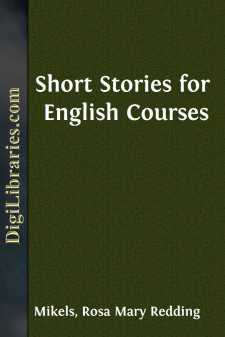Categories
- Antiques & Collectibles 13
- Architecture 36
- Art 48
- Bibles 22
- Biography & Autobiography 813
- Body, Mind & Spirit 142
- Business & Economics 28
- Children's Books 15
- Children's Fiction 12
- Computers 4
- Cooking 94
- Crafts & Hobbies 4
- Drama 346
- Education 46
- Family & Relationships 57
- Fiction 11828
- Games 19
- Gardening 17
- Health & Fitness 34
- History 1377
- House & Home 1
- Humor 147
- Juvenile Fiction 1873
- Juvenile Nonfiction 202
- Language Arts & Disciplines 88
- Law 16
- Literary Collections 686
- Literary Criticism 179
- Mathematics 13
- Medical 41
- Music 40
- Nature 179
- Non-Classifiable 1768
- Performing Arts 7
- Periodicals 1453
- Philosophy 64
- Photography 2
- Poetry 896
- Political Science 203
- Psychology 42
- Reference 154
- Religion 513
- Science 126
- Self-Help 84
- Social Science 81
- Sports & Recreation 34
- Study Aids 3
- Technology & Engineering 59
- Transportation 23
- Travel 463
- True Crime 29
Short Stories for English Courses
Categories:
Description:
Excerpt
Why must we confine the reading of our children to the older literary classics? This is the question asked by an ever- increasing number of thoughtful teachers. They have no wish to displace or to discredit the classics. On the contrary, they love and revere them. But they do wish to give their pupils something additional, something that pulses with present life, that is characteristic of to-day. The children, too, wonder that, with the great literary outpouring going on about them, they must always fill their cups from the cisterns of the past.
The short story is especially adapted to supplement our high- school reading. It is of a piece with our varied, hurried, efficient American life, wherein figure the business man's lunch, the dictagraph, the telegraph, the telephone, the automobile, and the railway "limited." It has achieved high art, yet conforms to the modern demand that our literature—since it must be read with despatch, if read at all—be compact and compelling. Moreover, the short story is with us in almost overwhelming numbers, and is probably here to stay. Indeed, our boys and girls are somewhat appalled at the quantity of material from which they must select their reading, and welcome any instruction that enables them to know the good from the bad. It is certain, therefore, that, whatever else they may throw into the educational discard when they leave the high school, they will keep and use anything they may have learned about this form of literature which has become so powerful a factor in our daily life.
This book does not attempt to select the greatest stories of the time. What tribunal would dare make such a choice? Nor does it attempt to trace the evolution of the short story or to point out natural types and differences. These topics are better suited to college classes. Its object is threefold: to supply interesting reading belonging to the student's own time, to help him to see that there is no divorce between classic and modern literature, and, by offering him material structurally good and typical of the qualities represented, to assist him in discriminating between the artistic and the inartistic. The stories have been carefully selected, because in the period of adolescence "nothing read fails to leave its mark"; [Footnote: G Stanley Hall, Adolescence, vol. II.] they have also been carefully arranged with a view to the needs of the adolescent boy and girl. Stories of the type loved by primitive man, and therefore easily approached and understood, have been placed first. Those which appealed in periods of higher development follow, roughly in the order of their increasing difficulty. It is hoped, moreover, that this arrangement will help the student to understand and appreciate the development of the story. He begins with the simple tale of adventure and the simple story of character. As he advances he sees the story develop in plot, in character analysis, and in setting, until he ends with the psychological study of Markheim, remarkable for its complexity of motives and its great spiritual problem. Both the selection and the arrangement have been made with this further purpose in view— "to keep the heart warm, reinforcing all its good motives, preforming choices, universalizing sympathies." [Footnote: Ibid.]
It is a pleasure to acknowledge, in this connection, the suggestions and the criticism of Mr. William N. Otto, Head of the Department of English in Shortridge High School, Indianapolis; and the courtesies of the publishers who have permitted the use of their material....


